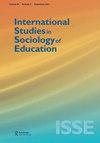Magic(al)ing in a time of COVID-19: becoming literacies and new inquiry practices
IF 1.5
Q2 EDUCATION & EDUCATIONAL RESEARCH
International Studies in Sociology of Education
Pub Date : 2021-08-29
DOI:10.1080/09620214.2021.1966826
引用次数: 1
Abstract
ABSTRACT This article conceptualizes the notion of magic(al)ing in relation to post-pandemic ways of thinking about data production and analyses. Revisiting old data produced pre-COVID-19 and engaging with new data produced during COVID-19, we consider the possibilities and potential of magic(al)ing as a theoretical concept. We think with several ideas informed by feminist ‘new’ materialists and post-inspired philosophies to conceptualize magic(al)ing: monism, spacetimemattering, blooms spaces and the pedagogy of an affective world. Over a year, we embarked on a reading/thinking inquiry about magic and literacies and their combined strength in locating literacies as embodied, relational, and sensory. Magic(al)ing has the potential to frame literacy moments as socio-material instances filled with affective flows and intensities. The concept of magic(al)ing fosters a space to not only rethink literacy but also to explore humans in relation to literacies. Kuby returns to an orange-paper-frog-puppet , a magic(al)ing moment that she often comes back to when thinking of the be(com)ing of literacies, especially in the uncertain times we find ourselves in a pandemic. Rowsell returns to a flowery artifact by a little girl who took part in a makerspace study in April 2019, speculating on how the same research could be conducted during lockdown. We also think-with new, unexpected data produced during COVID-19. As we engage again with these magic(al)ing moments, we explore the guest editors’ question: What methodological approaches are possible, and which kinds of research collaborations are appropriate?2019冠状病毒病时代的奇迹:成为素养和新的探究实践
本文将魔术(al)的概念概念化,与大流行后的数据生产和分析思维方式有关。回顾COVID-19之前产生的旧数据,并参与COVID-19期间产生的新数据,我们将魔术(al)ing作为一个理论概念的可能性和潜力考虑在内。我们从女权主义的“新”唯物主义和后灵感哲学中汲取灵感,将魔法概念化:一元论、时空关系、绽放空间和情感世界的教育学。在一年多的时间里,我们开始了一项关于魔法和识字的阅读/思考调查,以及它们在确定识字的具体、关系和感官方面的综合力量。魔法(al)有可能将识字时刻定义为充满情感流动和强度的社会物质实例。魔术(al)ing的概念培育了一个空间,不仅重新思考识字,而且探索人类与识字的关系。库比回到了一个橙色的纸青蛙木偶上,这是一个神奇的时刻,当她想到识字的到来时,尤其是在我们发现自己处于流行病的不确定时期,她经常会想起这个时刻。罗塞尔回到了一个小女孩的花工艺品上,这个小女孩参加了2019年4月的创客空间研究,并猜测如何在封锁期间进行同样的研究。我们还考虑到2019冠状病毒病期间产生的意想不到的新数据。当我们再次参与这些神奇的时刻时,我们探讨了客座编辑的问题:什么样的方法方法是可能的,什么样的研究合作是合适的?
本文章由计算机程序翻译,如有差异,请以英文原文为准。
求助全文
约1分钟内获得全文
求助全文
来源期刊
CiteScore
3.40
自引率
7.70%
发文量
34
期刊介绍:
International Studies in Sociology of Education is an international journal and publishes papers in the sociology of education which critically engage with theoretical and empirical issues, drawn from as wide a range of perspectives as possible. It aims to move debates forward. The journal is international in outlook and readership and receives papers from around the world. The journal publishes four issues a year; the first three are devoted to a particular theme while the fourth is an "open" issue.

 求助内容:
求助内容: 应助结果提醒方式:
应助结果提醒方式:


